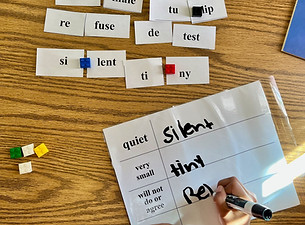
SPECIALTIES & EDUCATIONAL THERAPY SERVICES

EDUCATIONAL THERAPY,
MY APPROACH
Educational therapists understand how children (and adults) learn. They are attuned to the nuances of neurodiversity; and they are knowledgable about the varied ways in which autism, attention deficit hyperactivity disorder, giftedness, and learning disabilities such as dyslexia can impact academic progress. Educational therapists also closely apply their understanding of the social-emotional factors that accompany and impact learning challenges. Above all, educational therapists endeavor to uncover, leverage, and celebrate each student's strengths and interests. Certificated educational therapists (ETs) are trained in science-based, research-supported, and multimodal (sometimes referred to as multi-sensory) approaches. To enhance their practice, many ETs also complete additional coursework in specific methodologies (e.g., Orton-Gillingham, Making Math Real). ETs are trained to interpret formal assessments including neuropsychological and psychoeducational evaluations, and can translate these for families. Furthermore, ETs use data from these instruments to inform their work with their individual students. ETs may utilize an array of informal assessments, and they are qualified to administer, score, and interpret Level A and B tests as presented in the Standards for Educational and Psychological Testing. At Learning Edge Therapy, I seek to build a safe, positive, and supportive relationship with my students and their families. This is vital. If a child feels guarded, anxious, or judged, they will have difficulty acknowledging and exploring what feels hard. My approach is upbeat and compassionate. I consider the whole child and their past learning experiences. I communicate with other members of clients' "teams" including teachers, specialists, occupational therapists, speech and language pathologists, and psychotherapists. I meet students where they are today; endeavor to bring fun, laughter, and a sense of accomplishment to each session; and expect that we will work hard together. I am glad you took the time to read this and look forward to learning about your child's needs.

SPECIALTIES & TRAININGS
Multimodal, structured, science-based approach to teaching literacy Orton-Gillingham, Institute for Multi-Sensory Education (IMSE) Math (K-7) intervention and remediation Making Math Real 9-Lines Multiplication Facts Acquisition and Application Strategy® course completion Diagnostic formal assessments including Woodcock-Johnson IV (academic assessments), Comprehensive Test of Phonological Processing (CTOPP-2 ), TAPS-4 (assesses language processing and comprehension skills), Dynamic Indicators of Basic Early Literacy Skills (DIBELS ®), Test of Written Language (TOWL4), Test of Early Mathematics Ability (TEMA-3) Associate Member, Association of Education Therapists Member of CHADD, ADDitude, Dyslexia Association of Northern California For my education and professional background, please see ABOUT EILEEN.

GETTING STARTED
Initial contact with a new family is often via referral from another family, a teacher/learning specialist, psychotherapist, or an educational therapist. The steps below will follow. INTRODUCTORY CALL This is a short 15 minute phone call during which I gather information about your child's age, grade, and school. I will also ask you to briefly share your immediate concerns. At this point, it is useful to determine whether our schedules and logistics match. In most cases, momentum and continuity necessitate twice weekly sessions. Because progress is not linear and there are so many daily demands on children (even on the most outwardly appearing "successful" students), allowing a full week between sessions often creates a "two steps forward, one step back" scenario. Educational therapists tend to adhere to a "go slow to go fast" approach because it results in durable, long-lasting learning for our clients. Please note, whether or not we proceed to the next step, our communication is confidential. INTAKE FORM If our schedules appear to align and there is mutual interest in seeing if I will be a good fit for your child's needs, I will send an Intake Form for you to complete before our next meeting. I will also request any assessments, standardized tests, evaluations, etc. you have about your child. INTAKE INTERVIEW This meeting is approximately 45 minutes, likely virtual, and attended by the adult(s) who parent(s) the child. When we meet, I will have reviewed your Intake Form and may have some questions. For instance, I may ask you to tell me more about one of your child's passions or a past experience you noted on the Intake Form. During the Intake Interview, I hope to gain a deeper understanding of your thoughts and feelings about your child's learning journey. The Intake Interview is also an opportunity for you to learn more about how I operate. This may include my approach and methodologies, and any initial thoughts I have about helping your child. SERVICE AGREEMENT This is an exciting step, because it signals I am joining your child's team and will begin providing them with ET services! Once services begin, I will touch base with brief updates to note successes, observations, and questions/concerns. These updates will become less frequent over time. At the end of each school term (winter, spring), I will provide you with a comprehensive progress report. Requests for additional meetings, reporting, etc. will be outlined in our Service Agreement.